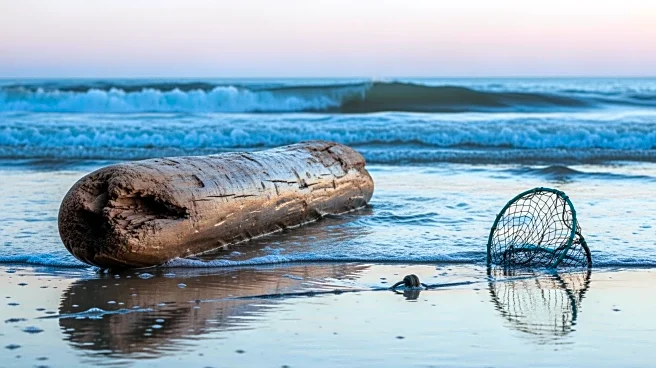What's Happening?
A study conducted by the University of St Andrews reveals that African penguins, classified as Critically Endangered, are increasingly competing with commercial fishing vessels for food. This competition intensifies during years when fish stocks are low,
leading to heightened pressure on the penguin population. The research introduces a metric called 'overlap intensity' to measure the extent of interaction between penguins and fishing vessels. The study highlights a significant decline in African penguin numbers, with an 80% drop over the past three decades, largely due to competition for sardines and anchovies, their primary food sources. The research utilized tracking data from penguins on Robben and Dassen Island, showing a sharp increase in overlap during years of low fish biomass, such as 2016, when 20% of penguins foraged in areas with active fishing vessels.
Why It's Important?
The findings underscore the urgent need for effective conservation strategies to protect African penguins from further decline. The study's introduction of 'overlap intensity' provides a valuable tool for assessing ecological risks and guiding fishery management. The increased competition for food during low fish stock years poses a significant threat to penguin populations, particularly during chick-rearing periods. The research supports the establishment of dynamic marine protected areas that can adapt to changes in predator and prey behavior, offering a potential solution to mitigate the impact of fishing on penguin colonies. The study also highlights the importance of legal measures, such as fishing closures near breeding sites, to safeguard the penguins' habitat.
What's Next?
Following the study, conservation organizations and the fishing industry reached a high court agreement in South Africa to implement fishing closures around penguin colonies. The South African government has reinstated no-fishing zones near Robben Island, a key breeding site for African penguins. These measures aim to reduce the overlap intensity and protect the penguins from further decline. The research provides a basis for ongoing monitoring and adjustment of protected areas to ensure the survival of the species. Continued collaboration between scientists, conservationists, and policymakers will be crucial in developing effective strategies to balance ecological conservation with fishing industry interests.
Beyond the Headlines
The study highlights broader implications for ecosystem-based fishery management and the need for adaptive conservation strategies. The concept of 'overlap intensity' could be applied to other species facing similar challenges, offering insights into predator-prey dynamics and the impact of human activities on wildlife. The legal battles surrounding fishing restrictions near penguin colonies reflect the complex interplay between conservation efforts and economic interests. The research emphasizes the importance of integrating scientific findings into policy decisions to achieve sustainable outcomes for both wildlife and human communities.

















